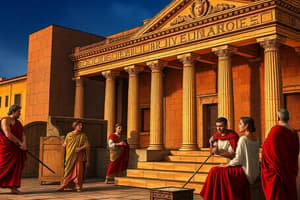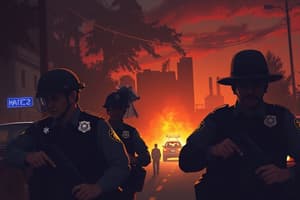Podcast
Questions and Answers
Which event resulted in the establishment of the United Nations and the recognition of Israel?
Which event resulted in the establishment of the United Nations and the recognition of Israel?
- World War II (correct)
- Civil Rights Movement
- 1857 Uprising
- World War I
Which conflict highlighted the devastating impact of total war and introduced the use of poison gas and mechanized warfare?
Which conflict highlighted the devastating impact of total war and introduced the use of poison gas and mechanized warfare?
- 1857 Uprising
- World War II
- Civil Rights Movement
- World War I (correct)
The collapse of major empires and the reshaping of Europe were consequences of which historical event?
The collapse of major empires and the reshaping of Europe were consequences of which historical event?
- 1857 Uprising
- World War I (correct)
- World War II
- Civil Rights Movement
Which uprising is also known as the Indian Rebellion of 1857?
Which uprising is also known as the Indian Rebellion of 1857?
Which event profoundly shaped our understanding of civics by highlighting the dangers of nationalism, fascism, and militarism?
Which event profoundly shaped our understanding of civics by highlighting the dangers of nationalism, fascism, and militarism?
What was the main purpose of the Civil Rights Movement in the 1950s-1960s?
What was the main purpose of the Civil Rights Movement in the 1950s-1960s?
Which event is often referred to as the 'first war of independence' by some Indians?
Which event is often referred to as the 'first war of independence' by some Indians?
Who were some of the iconic figures that led the Civil Rights Movement?
Who were some of the iconic figures that led the Civil Rights Movement?
What did the 1857 uprising expose about the Indian population under British rule?
What did the 1857 uprising expose about the Indian population under British rule?
Which historical event challenged the nation's commitment to democracy and equal rights in America?
Which historical event challenged the nation's commitment to democracy and equal rights in America?
Flashcards are hidden until you start studying
Study Notes
Historical Context and Civic Lessons
Delving into the rich tapestry of human history, we'll explore several pivotal events that have profoundly shaped our world and our understanding of civics. These episodes offer valuable insights into the human condition, the evolution of rights and freedoms, and the consequences of waging war.
World War II (1939-1945)
This global conflict, which engulfed much of the world, is a vivid reminder of the dangers of nationalism, fascism, and militarism. World War II fundamentally changed the global landscape, resulting in the establishment of the United Nations, the recognition of Israel, and the dismantling of the Nazi regime. It also brought about a renewed appreciation of the value of human rights and the consequences of genocide.
World War I (1914-1918)
As the "Great War," World War I demonstrated the devastating impact of total war and the importance of conflict resolution. It resulted in the collapse of four major empires, reshaped the map of Europe, and set the stage for the rise of fascism and communism. The war also introduced the use of poison gas, mechanized warfare, and aerial bombardment, highlighting the potential for human innovation to be used for destructive purposes.
The 1857 Uprising
Also known as the Indian Rebellion of 1857 or the Sepoy Mutiny, the 1857 uprising was a significant event in the history of colonial India. It was a violent uprising against the British East India Company's rule, largely driven by Indian sepoys and other soldiers. The uprising exposed the injustices and hardships faced by the Indian population under British rule, and it led to the eventual establishment of the British Raj. The events of 1857 have even been called the "first war of independence" by some Indians, emphasizing the role of resistance in the struggle for self-determination.
The Civil Rights Movement (1950s-1960s)
This social movement aimed at ending legal segregation and disenfranchisement of African Americans. The Civil Rights Movement was a pivotal moment in American history, as it challenged the nation's commitment to democracy and equal rights. Led by iconic figures such as Dr. Martin Luther King Jr., Malcolm X, and Rosa Parks, the Civil Rights Movement succeeded in advancing the cause of civil rights and spurred social change in many other areas of society.
Through the study of these events, we gain a deeper understanding of human history, our shared heritage, and the complexities of civics. Each example presents unique challenges and opportunities, and their study offers valuable insights into our past and a path towards a more just and equitable future. World War II, Encyclopædia Britannica, https://www.britannica.com/event/World-War-II World War I, Encyclopædia Britannica, https://www.britannica.com/event/World-War-I 1857 Uprising, Encyclopædia Britannica, https://www.britannica.com/event/Indian-Rebellion-of-1857 Civil Rights Movement, Encyclopædia Britannica, https://www.britannica.com/event/Civil-Rights-Movement
Studying That Suits You
Use AI to generate personalized quizzes and flashcards to suit your learning preferences.




